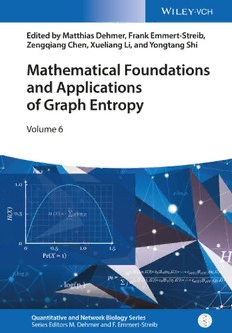
Mathematical foundations and applications of graph entropy PDF
Preview Mathematical foundations and applications of graph entropy
Editedby MatthiasDehmer,FrankEmmert-Streib, ZengqiangChen,XueliangLi,and YongtangShi MathematicalFoundationsand ApplicationsofGraphEntropy “QuantitativeandNetworkBiology” SerieseditorsM.DehmerandF.Emmert-Streib AdvisoryBoard: Albert-LászlóBarabási NortheasternUniversity&HarvardMedicalSchool,USA DouglasLauffenburger MassachusettsInstituteofTechnology,USA SatoruMiyano UniversityofTokyo,Japan IlyaShmulevich InstituteforSystemsBiology&UniversityofWashington,USA PreviousVolumesofthisSeries: Volume1 Volume4 Dehmer,M.,Emmert-Streib,F.,Graber,A., Emmert-Streib,F.Dehmer,M.(eds.) Salvador,A.(eds.) AdvancesinNetwork AppliedStatisticsforNetwork Complexity Biology 2013 MethodsinSystemsBiology ISBN:978-3-527-33291-5 2011 ISBN:978-3-527-32750-8 Volume5 Dehmer,M.,Emmert-Streib,F.,Pickl,S. (eds.) Volume2 Dehmer,M.,Varmuza,K.,Bonchev,D.(eds.) ComputationalNetwork StatisticalModellingof Theory MolecularDescriptorsin 2015 QSAR/QSPR ISBN:978-3-527-33724-8 2012 Volume6 ISBN:978-3-527-32434-7 Dehmer,M.,Chen,Z.,Li,X.,Shi,Y., Emmert-Streib,F. Volume3 Emmert-Streib,F.Dehmer,M.(eds.) MathematicalFoundations andApplicationsofGraph StatisticalDiagnosticsfor Entropy Cancer AnalyzingHigh-DimensionalData 2017 ISBN:978-3-527-33909-9 2013 ISBN:978-3-527-32434-7 QuantitativeandNetworkBiologySeries EditorsM.DehmerandF.Emmert-Streib Volume6 Mathematical Foundations and Applications of Graph Entropy Editedby MatthiasDehmer,FrankEmmert-Streib,ZengqiangChen, XueliangLi,andYongtangShi TheEditors AllbookspublishedbyWiley-VCHare carefullyproduced.Nevertheless,authors, Prof.MatthiasDehmer editors,andpublisherdonotwarrantthe NankaiUniversity informationcontainedinthesebooks, CollegeofComputerandControl includingthisbook,tobefreeoferrors. Engineering Readersareadvisedtokeepinmindthat Tianjin300071 statements,data,illustrations,procedural PRChina detailsorotheritemsmayinadvertently beinaccurate. and LibraryofCongressCardNo.:appliedfor UMIT-TheHealth&LifeSciences BritishLibraryCataloguing-in-Publication University Data DepartmentofBiomedicalComputer Acataloguerecordforthisbookisavail- SciencesandMechatronics ablefromtheBritishLibrary. Eduard-Wallnöfer-Zentrum1 6060Hall/Tyrol Austria Bibliographicinformationpublishedby theDeutscheNationalbibliothek TheDeutscheNationalbibliothek Prof.FrankEmmert-Streib liststhispublicationintheDeutsche TampereUniversityofTechnology Nationalbibliografie;detailed PredictiveMedicineandAnalyticsLab bibliographicdataareavailableonthe DepartmentofSignalProcessing Internetat<http://dnb.d-nb.de>. Tampere Finland ©2016Wiley-VCHVerlagGmbH&Co. Prof.ZengqiangChen KGaA,Boschstr.12,69469Weinheim, NankaiUniversity Germany CollegeofComputerandControl Engineering Allrightsreserved(includingthoseof Tianjin300071 translationintootherlanguages).Nopart PRChina ofthisbookmaybereproducedinany form – byphotoprinting,microfilm,or Prof.XueliangLi anyothermeans – nortransmittedor NankaiUniversity translatedintoamachinelanguage CenterforCombinatorics withoutwrittenpermissionfromthe 94WeijinRoad publishers.Registerednames,trademarks, Tianjin300071 etc.usedinthisbook,evenwhennot China specificallymarkedassuch,arenottobe consideredunprotectedbylaw. Prof.YongtangShi PrintISBN:978-3-527-33909-9 NankaiUniversity ePDFISBN:978-3-527-69322-1 CenterforCombinatorics ePubISBN:978-3-527-69325-2 No.94WeijinRoad MobiISBN:978-3-527-69323-8 Tianjin300071 oBookISBN:978-3-527-69324-5 China Typesetting SPiGlobal,Chennai,India Printedonacid-freepaper V Contents ListofContributors XI Preface XV 1 EntropyandRenormalizationinChaoticVisibilityGraphs 1 BartoloLuque,FernandoJavierBallesteros,AlbertoRobledo, andLucasLacasa 1.1 MappingTimeSeriestoNetworks 2 1.1.1 NaturalandHorizontalVisibilityAlgorithms 4 1.1.2 ABriefOverviewofSomeInitialApplications 8 1.1.2.1 Seismicity 8 1.1.2.2 Hurricanes 8 1.1.2.3 Turbulence 9 1.1.2.4 FinancialApplications 9 1.1.2.5 Physiology 9 1.2 VisibilityGraphsandEntropy 10 1.2.1 DefinitionsofEntropyinVisibilityGraphs 10 1.2.2 PesinTheoreminVisibilityGraphs 12 1.2.3 GraphEntropyOptimizationandCriticalPoints 19 1.3 RenormalizationGroupTransformationsofHorizontalVisibility Graphs 26 1.3.1 TangentBifurcation 29 1.3.2 Period-DoublingAccumulationPoint 31 1.3.3 Quasi-Periodicity 32 1.3.4 EntropyExtremaandRGTransformation 34 1.3.4.1 Intermittency 35 1.3.4.2 PeriodDoubling 35 1.3.4.3 Quasi-periodicity 35 1.4 Summary 36 1.5 Acknowledgments 37 References 37 2 GeneralizedEntropiesofComplexandRandomNetworks 41 VladimirGudkov 2.1 Introduction 41 VI Contents 2.2 GeneralizedEntropies 42 2.3 EntropyofNetworks:DefinitionandProperties 43 2.4 ApplicationofGeneralizedEntropyforNetworkAnalysis 45 2.5 OpenNetworks 53 2.6 Summary 59 References 60 3 InformationFlowandEntropyProductiononBayesian Networks 63 SosukeItoandTakahiroSagawa 3.1 Introduction 63 3.1.1 Background 63 3.1.2 BasicIdeasofInformationThermodynamics 64 3.1.3 OutlineofthisChapter 65 3.2 BriefReviewofInformationContents 66 3.2.1 ShannonEntropy 66 3.2.2 RelativeEntropy 67 3.2.3 MutualInformation 68 3.2.4 TransferEntropy 69 3.3 StochasticThermodynamicsforMarkovianDynamics 70 3.3.1 Setup 70 3.3.2 Energetics 72 3.3.3 EntropyProductionandFluctuationTheorem 73 3.4 BayesianNetworks 76 3.5 InformationThermodynamicsonBayesianNetworks 79 3.5.1 Setup 79 3.5.2 InformationContentsonBayesian Networks 80 3.5.3 EntropyProduction 83 3.5.4 GeneralizedSecondLaw 84 3.6 Examples 86 3.6.1 Example1:MarkovChain 86 3.6.2 Example2:FeedbackControlwithaSingleMeasurement 86 3.6.3 Example3:RepeatedFeedbackControlwithMultiple Measurements 89 3.6.4 Example4:MarkovianInformationExchanges 91 3.6.5 Example5:ComplexDynamics 94 3.7 SummaryandProspects 95 References 96 4 Entropy,Counting,andFractionalChromaticNumber 101 SeyedSaeedChangizRezaei 4.1 EntropyofaRandomVariable 102 4.2 RelativeEntropyandMutualInformation 104 4.3 EntropyandCounting 104 Contents VII 4.4 GraphEntropy 107 4.5 EntropyofaConvexCorner 107 4.6 EntropyofaGraph 108 4.7 BasicPropertiesofGraphEntropy 110 4.8 EntropyofSomeSpecialGraphs 112 4.9 GraphEntropyandFractionalChromaticNumber 116 4.10 SymmetricGraphswithrespecttoGraphEntropy 119 4.11 Conclusion 120 Appendix4.A 121 References 130 5 GraphEntropy:RecentResultsandPerspectives 133 XueliangLiandMeiqinWei 5.1 Introduction 133 5.2 InequalitiesandExtremalPropertieson(Generalized)Graph Entropies 139 5.2.1 InequalitiesforClassicalGraphEntropiesandParametric Measures 139 5.2.2 GraphEntropyInequalitieswithInformationFunctions fV,fP and fC 141 5.2.3 InformationTheoreticMeasuresofUHGGraphs 143 5.2.4 BoundsfortheEntropiesofRootedTreesandGeneralized Trees 146 5.2.5 InformationInequalitiesforI (G)basedonDifferentInformation f Functions 148 5.2.6 ExtremalPropertiesofDegree-andDistance-BasedGraph Entropies 153 5.2.7 ExtremalityofIf𝜆(G),If2(G)If3(G)andEntropyBoundsfor Dendrimers 157 5.2.8 Sphere-RegularGraphsandtheExtremalityEntropiesI (G) f2 andIf𝜎(G) 163 5.2.9 InformationInequalitiesforGeneralizedGraphEntropies 166 5.3 RelationshipsbetweenGraphStructures,GraphEnergies, TopologicalIndices,andGeneralizedGraphEntropies 171 5.4 SummaryandConclusion 179 References 180 6 StatisticalMethodsinGraphs:ParameterEstimation,ModelSelection, andHypothesisTest 183 SuzanadeSiqueiraSantos,DanielYasumasaTakahashi,JoãoRicardoSato, CarlosEduardoFerreira,andAndréFujita 6.1 Introduction 183 6.2 RandomGraphs 184 6.3 GraphSpectrum 187 6.4 GraphSpectralEntropy 189 VIII Contents 6.5 Kullback–LeiblerDivergence 192 6.6 Jensen–ShannonDivergence 192 6.7 ModelSelectionandParameterEstimation 193 6.8 HypothesisTestbetweenGraphCollections 195 6.9 FinalConsiderations 198 6.9.1 ModelSelectionforProtein–ProteinNetworks 199 6.9.2 HypothesisTestbetweentheSpectralDensitiesofFunctionalBrain Networks 200 6.9.3 EntropyofBrainNetworks 200 6.10 Conclusions 200 6.11 Acknowledgments 201 References 201 7 GraphEntropiesinTextureSegmentationofImages 203 MartinWelk 7.1 Introduction 203 7.1.1 StructureoftheChapter 203 7.1.2 QuantitativeGraphTheory 204 7.1.3 GraphModelsinImageAnalysis 205 7.1.4 Texture 206 7.1.4.1 ComplementarityofTextureandShape 206 7.1.4.2 TextureModels 207 7.1.4.3 TextureSegmentation 208 7.2 GraphEntropy-BasedTextureDescriptors 209 7.2.1 GraphConstruction 210 7.2.2 Entropy-BasedGraphIndices 211 7.2.2.1 Shannon’sEntropy 212 7.2.2.2 BonchevandTrinajstic´’sMeanInformationonDistances 212 7.2.2.3 DehmerEntropies 213 7.3 GeodesicActiveContours 214 7.3.1 BasicGACEvolutionforGrayscaleImages 214 7.3.2 ForceTerms 215 7.3.3 MultichannelImages 216 7.3.4 RemarksonNumerics 216 7.4 TextureSegmentationExperiments 217 7.4.1 FirstSyntheticExample 217 7.4.2 SecondSyntheticExample 218 7.4.3 Real-WorldExample 220 7.5 AnalysisofGraphEntropy-BasedTextureDescriptors 221 7.5.1 RewritingtheInformationFunctionals 221 7.5.2 InfiniteResolutionLimitsofGraphs 222 7.5.3 FractalAnalysis 223 7.6 Conclusion 226 References 227
